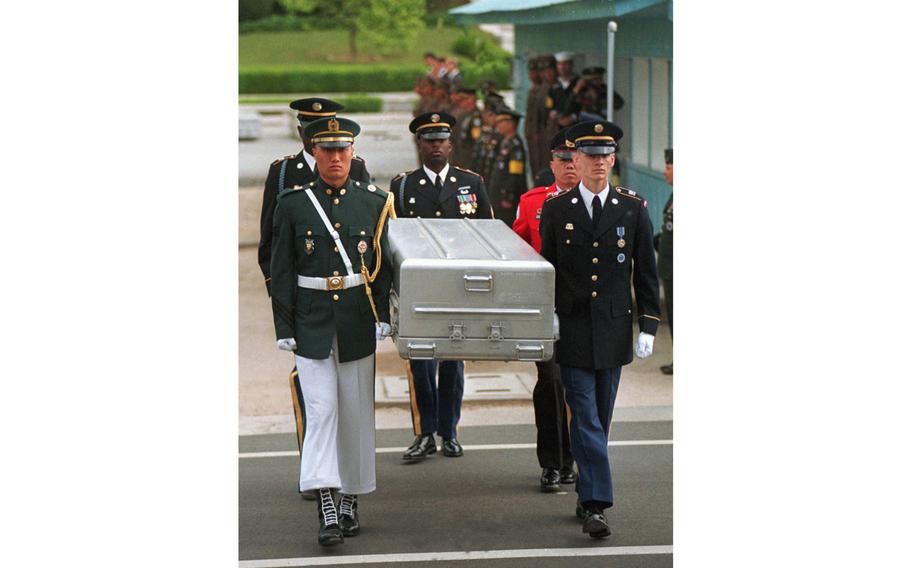
U.N. honor guards carry a coffin containing the remains of U.S. soldiers after it was returned from North Korea at the border village of Panmunjom, South Korea, on May 14, 1999. South Korean media reported that the U.S. military plans to send 215 caskets to North Korea through a border village on Saturday, June 23, 2018. (Ahn Young-joon/AP)
SEOUL, South Korea – The U.S. military sent 100 wooden coffins to the border with North Korea on Saturday as it steps up preparations for the return of the remains of American soldiers killed in the 1950-53 war, according to the U.N. Command.
North Korean leader Kim Jong Un agreed to repatriate the remains as part of the four-point agreement reached during his June 12 summit with President Donald Trump.
No date has been set for the return and it was not yet clear exactly where the repatriation would occur, but military officials have said it’s expected to happen soon.
The agency that oversees POW/MIA issues has cited North Korean officials as saying they have as many as 200 sets of remains that have been recovered over the years and are ready to be returned.
The military moved “100 wooden temporary transit cases” that had been built in Seoul to the Joint Security Area on Saturday “so that we are ready to receive remains and be able to transport them in a dignified manner,” the U.N. Command’s public affairs office told Stars and Stripes.
The command also was in the process of moving flags and trestles on which the boxes can stand to the JSA, the area in the truce village of Panmunjom that marks the only spot in the heavily fortified border where the sides come face-to-face.
Meanwhile, it was sending 158 metal temporary transfer cases that could be used to send the remains home from Seoul’s Yongsan Army Garrison south to Osan Air Base, the command said.
The planned location for the return was not yet known, but officials said they were stationing the temporary coffins at the JSA since it is the closest point.
It would be the first such repatriation in more than a decade and would be the first tangible benefit stemming from the summit.
More than 36,000 U.S. troops died in the three-year war, which ended in an armistice instead of a peace treaty.
That number includes 7,702 who are missing in action, with an estimated 5,300 believed to have been lost in the North, according to the Defense POW/MIA Accounting Agency.
Recovery efforts have been subject to rising tensions over the North’s nuclear weapons program. Once they are returned, the remains will have to be identified at a forensics lab in Hawaii to determine if they are Americans or allied servicemembers – often a challenging task.
Joint U.S.-North Korean military search teams recovered 229 sets of American remains from North Korea between 1996 and 2005.
The United States was allowed to conduct 33 investigative and recovery operations in the country before former President George W. Bush’s administration called off the search, claiming the safety of American participants was not guaranteed.
Critics at the time also argued the North was using the program to extort money from Washington, prompting the label “bones for bucks.”
The last repatriation was in 2007 when then-New Mexico Gov. Bill Richardson traveled to Pyongyang and returned with six sets of remains.
South Korea’s President Moon Jae-in also has said that he hoped to use the burgeoning goodwill with the North to send teams to retrieve remains from the Demilitarized Zone and other areas. South Korea still has more than 120,000 troops that are unaccounted for.
gamel.kim@stripes.com Twitter: @kimgamel